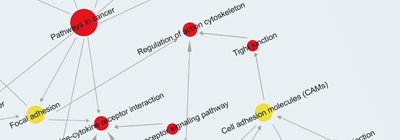
Signal transduction, also known as cell signaling, is the transmission of molecular signals from a cell's exterior to its interior. Signal transduction is responsible for many processes such as cell growth, proliferation, healing, differentiation, metabolism and communication. Signal transduction pathways is the process by which a physical or chemical signal is transmitted through a cell as a series of molecular events, most commonly protein phosphorylation catalyzed by protein kinases, which ultimately results in a cellular response. The intracellular signaling transduction is highly receptor specific, thereby maintaining the specificity of the incoming signal inside the cell. Signal transduction pathways amplify the incoming signal by a signaling cascade using a network of enzymes that act on one another in specific ways to ultimately generate a precise and appropriate physiological response by the cell.
A ligand-gated ion channel, upon binding with a ligand, changes conformation to open a channel in the cell membrane through which ions relaying signals can pass. An example of this mechanism is found in the receiving cell of a neural synapse. The influx of ions that occurs in response to the opening of these channels induces action potentials, such as those that travel along nerves, by depolarizing the membrane of post-synaptic cells, resulting in the opening of voltage-gated ion channels.
Elabscience® provides customers with abundant and various kinds of ELISA kits and antibodies for the studies of signal pathways including JAK-STAT Pathway, NF-κB Pathway, Toll-like Receptor Pathway, TGF-β Pathway, p53 Pathway and so on. Browse this page to find the products for your related researches.
Browse all products related to Signal Transduction research



